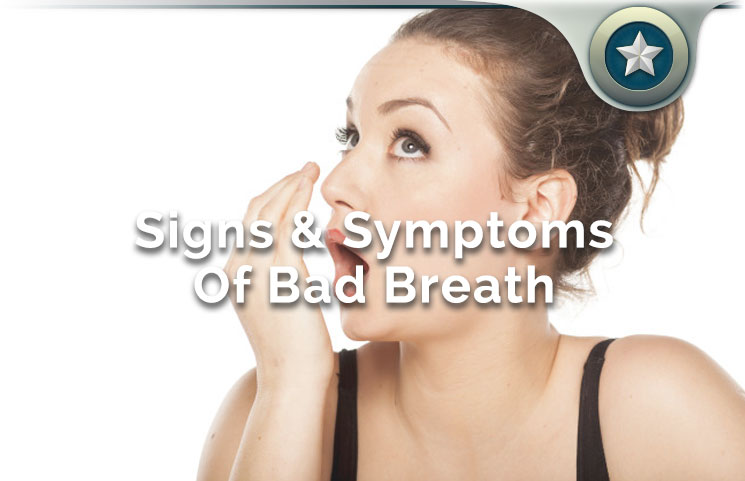Bad breath is a medical condition known as fetororis, or halitosis. It is a common problem that can result in significant psychological distress to anyone. Any individual can be a victim of bad breath. In fact, it is estimated that every 1 in 4 people experiences bad breath on a regular basis.
Halitosis is the 3rd most common reason as to why people seek dental care. The most obvious and common cause of bad breath is practicing poor dental hygiene. This is because as bacteria breaks down particles of food, there is production of sulfur compounds that in turn causes bad odor.
Sign & Symptoms
Most people who have halitosis are usually unaware of it, or they might experience temporary signs and symptoms. The odor normally depends upon the underlying cause or the source of bad breath. There are some common signs and symptoms that are usually associated with bad breath and these include the following:
- A coating on the tongue
- Feeling of a dry mouth
- Feeling of bad taste in the mouth, a sour taste, or even taste changes
- Smell of bad breath

How To Check For Bad Breath
It is nearly impossible for someone to smell their own breath. This is because your nose is unable to even perceive the foulest smells emitted from the mouth. The explanation for this is that the nose cannot detect smell in itself, but rather the changes in smell.
Some individuals try to check for bad breath by exhaling and covering the mouth using the palm. Despite the fact that this method usually gives a person some rough idea on the smell of their breath, it often fails to give the exact nature of the mouth’s smell.
It is because of the above reasons that it is recommended that one should request a dentist or a reliable person to provide them with an objective opinion of their breath. Alternatively, one can scratch the back of their tongue with the help of a tongue cleaner and keenly sniff it for any odor.
There are some sophisticated detectors that are used for the diagnosis of halitosis, these include the following:
Halimeter
This is used in the detection of levels of sulfur.
Beta-Galactosidase Test
A correlation between mouth odor and levels of the enzyme beta-galactosidase has successfully been established.
BANA Test
This is a test that measures for the presence of a specific enzyme that is produced by undesired halitosis-causing bacteria.
Gas Chromatography
This functions to measure 3 volatile sulfur compounds i.e. dimethyl sulfide, methyl mercaptan, and hydrogen sulfide.

Risk Factors of Bad Breath
There are a number of risk factors for halitosis. Some of the notable ones include the following:
Tobacco & Alcohol
Consumption of alcohol and products of tobacco are often associated with bad breath and gum disease. This is because alcohol and smoking dry up the mucous membranes and mouth, making them prone to bacterial infection that is known to further aggravate bad breath.
Digestive Disorders
There are some digestive disorders that can result in a person having bad breath, such as chronic constipation, intestinal sluggishness, and gastro- intestinal disorders.
Lung Disorders
Infection of the lungs and any disorders related to it, such as bronchiectasis and bronchitis, cause bad breath.
ENT Disorders
An underlying ENT disorder can have bad breath as its warning sign. Such disorders include chronic tonsillitis, sinusitis, dried mucous cough, stuffy nose, and simple colds. These ENT disorders result in a dried mucous discharge at the back section of the throat, which in turn is a major cause of bad breath.
Protein Rich Food
Anaerobic bacteria tend to thrive on residue leftover of protein origin located in the mouth to produce sulphide that promotes bad breath. This is why people with poor oral hygiene should avoid consuming food rich in protein like beans (lentils, soybeans), nuts (peanut, avocados, almonds), and meat (salmon, tuna, turkey, chicken, beef).
Sulphide
Sulphide is regarded as the most common risk factor for bad breath. This is because sulphide compounds possess a characteristic pungent odor that resembles rotten eggs. These compounds are volatile and can therefore easily evaporate to leave behind a pungent odor.
Anaerobic bacteria (those that can thrive without oxygen) in the human mouth are responsible for producing sulphide, regardless of whether a mouth is healthy or not. When the numbers of these bacteria surge in the mouth, the odor produced becomes marked.
Furthermore, the intake of certain foods that are enriched with sulphide like garlic, onions, and other strong spices can result in bad breath.
Oral Disorders
There are several oral disorders that are significant risk factors for bad breath. These oral disorders include mouth ulcer, abscess, tooth decay, gingivitis, plaque, pyorrhoea, as well as other periodontal diseases.
Diseases
Diseases such as gastroesophageal reflex disorder (GERD), diabetes, and kidney disease can be a cause of bad breath.
Crash Dieting
Consumption of low-carbohydrate diets, fasting, and crash dieting are risk factors for developing halitosis. This is because they cause the human body to break down fats, a process that produces ketones, which are basically chemicals that can cause bad breath.
Medication
There are certain types of medications that can result in bad breath. Some of the notable ones include the ones listed below:
- Phenothiazines (tranquilizers)
- Some chemotherapy medications
- Nitrates that are usually used in the treatment of chest pain and angina.
Treatments For Bad Breath
The different treatments for bad breath normally depend on the particular cause. However, the treatment that is considered to be the most effective is improving oral hygiene. Good oral hygiene should consist of:
- Cleaning the tongue
- Brushing the teeth and gums
- Flossing between teeth
In fact, it is advisable to invest in an electric toothbrush that makes dental cleaning easier and far more effective than regular toothbrushes.
Cleaning Teeth
Dentists recommend that people should brush their teeth using fluoride toothpaste at least twice daily. Below are a few tips of how to properly brush teeth and to keep the mouth healthy:
- Brushing your teeth should be avoided for at least 30 minutes following the consumption of an acidic drink, like eating acidic fruit or fruit juice. This helps in preventing the occurrence of tooth abrasion.
- A tongue scraper or a separate toothbrush should be used to lightly brush the tongue. It is important to note that there are some toothbrush brands that are designed with a tongue cleaner on the back of the brush head to aid the consumer with this function.
- Every area of the tooth ought to be brushed with particular attention being paid to the locations where the tooth and gums meet. Oral hygienists or dentists may recommend the use of a special single-tufted brush for particular problem areas of the mouth.
- Toothbrushes should be replaced every 3-4 months.
- The ideal toothbrush for cleaning teeth is a small or medium-sized one with synthetic bristles that are multi-tufted and soft.
- A dental floss should be used for cleaning between the teeth, as well as for removing trapped food that result in tooth decay. It is suspected that brushing on its own is only capable of cleaning close to 60% of the surface of the tooth.
Dentists usually recommend that people rinse the mouth with the help of an anti-odor or antibacterial mouthwash. However, this rinse should not replace brushing, and should only be addition to the daily oral routine.
Cleaning Dentures
Individuals who wear dentures should take them out to clean them and let the mouth rest every night. The dentures should be thoroughly cleaned before returning them to the mouth the following morning. Here are a few tips on how to clean dentures:
- Toothpaste should not be used to clean dentures because this can causes scratches and stains to the surface.
- Dentures should be thoroughly cleaned using lukewarm water and soap with a denture-cleaning tablet or denture cream.
- A separate toothbrush should be used to clean dentures.
The above routine should allow your dentures to stay fresh and clean, thus preventing the buildup of plaque that could cause bad breath.
Tips For Keeping Fresh Breath
There are certain habits that can help in maintaining fresh breath. Some of them include the following:
- Reducing coffee intake.
- Drinking an excess amount of water that prevents drying up of the mouth.
- Quitting smoking.
- Eating a healthy and balanced diet. Furthermore, avoid consuming foods that are spicy or strongly flavored.
- Reducing alcohol consumption.
- Braces and retainers should be cleaned as directed by the dentist.
- Reducing the quantities of sugary drinks or foods, as they increase bacteria count in the mouth.
- Chewing sugar-free gum after meals to stimulate saliva flow. This also helps in cleaning away any food particles that were remaining in the mouth.
Gastrointestinal Problems
The treatment that is recommended for gastrointestinal problems depends on the type of condition that is prevailing. A gastroenterologist is best suited to make the diagnosis. For instance, those who have been diagnosed with stomach ulcers will require a combination of 2-3 different antibiotics, as well as a proton pump inhibitor (PPI). It is referred to as eradication therapy.
Diet
Rough foods that help to clean the back of the tongue should be included in breakfast. Onions and garlic should be avoided.
Bad Breath Conclusion
Bad breath can be a symptom of a health disorder. Often, it is a warning signal for an individual to closely examine their habits and lifestyle. Bad breath should not be left untreated, or it may signal disorders such as pyorrhoea, diabetes, stomach issues, or numerous other health problems.









